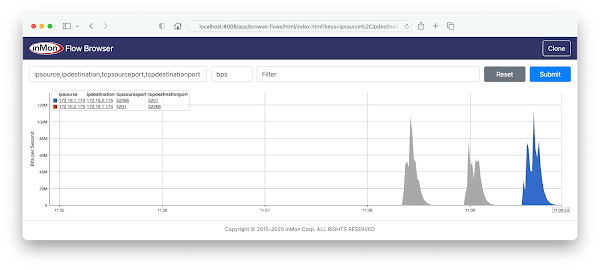VyOS described deficiencies with the embedded sFlow implementation in the open source
VyOS router operating system and suggested that the open source
Host sFlow agent be installed as an alternative. The VyOS developer community embraced the suggestion and has been incredibly responsive, integrating, and releasing a version of VyOS with Host sFlow support within a week.
vyos@vyos:~$ show version
Version: VyOS 1.4-rolling-202303170317
Release train: current
Built by: autobuild@vyos.net
Built on: Fri 17 Mar 2023 03:17 UTC
Build UUID: 45391302-1240-4cc7-95a8-da8ee6390765
Build commit ID: e887f582cfd7de
Architecture: x86_64
Boot via: installed image
System type: guest
Hardware vendor: innotek GmbH
Hardware model: VirtualBox
Hardware S/N: 0
Hardware UUID: 871dd0f0-c4ec-f147-b1a7-ed536511f141
Copyright: VyOS maintainers and contributors
Verify that the version of of VyOS is
VyOS 1.4-rolling-202303170317 or later
set system sflow interface eth0
set system sflow interface eth1
set system sflow interface eth2
set system sflow polling 30
set system sflow sampling-rate 1000
set system sflow server 10.0.0.30 port 6343
The above commands configure sFlow export in the VyOS CLI using the embedded Host sFlow agent.
docker run --name sflow-rt -p 8008:8008 -p 6343:6343/udp -d sflow/prometheus
A quick way to experiment with sFlow is to run the pre-built
sflow/prometheus image using Docker on the sFlow server (in this case on 10.0.0.30). The chart at the top of the page uses the
Flow Browser application to display an up to the second view of the largest tcp flows through the VyOS router, click on
this link to open the application with the settings shown.
Flow metrics with Prometheus and Grafana describes how integrate flow analytics into operational dashboards.
DDoS protection quickstart guide describes how to use real-time sFlow analytics with BGP Flowspec / RTBH to automatically mitigate DDoS attacks.




No comments:
Post a Comment